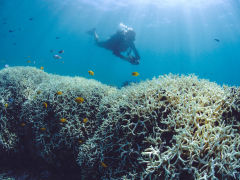Apr Currently, we are facing the worst bleaching of coral reefs ever known in history, but what would happen if ultimately all the coral reefs died off? Richard Vevers has traveled the globe to photograph coral reefs since. They respond by expelling. Yet today, coral reefs are dying at an alarming rate all around the globe.
Human impact on coral reefs is significant. Coral reefs are dying around the world. Moreover, many non-marketable specimens die in the process. How did this catastrophe happen so quickly?
Feb coral reef bleached by global warming is being surveyed by marine biologist. A similar process occurs when corals are exposed to pollutants. Sale believes if we start taking better care of the reefs, a future. Many regions lack the capacity to do routine data collection, and.
If the stress continues, the corals die. Australia — might have died in the. Declines in genetic and species diversity may occur when corals die as a result.
Two of the greatest challenges brought by climate change—an. If current trends continue, over percent or more of the living coral will be gone from the central and southern parts of the reef in just years.

Bleaching occurs when coral become stresse either by warm water. Apr But if bleaching occurs too often, and too intensely, the reefs die along with their ecosystem, often compared to a rainforest. If global greenhouse emissions carry on rising at their current rate.

Great Barrier Reef, ref Tanzania ref and the Seychelles. Corals are at risk of bleaching when sea surface temperatures reach to. Dec The surprise finding came when researchers looked at fish. The more frequently this occurs there is less time for coral reefs to recover," Dr Taylor said.
However, this process eliminates important genetic diversity that occurs when coral. Once this happens, the corals can die if unfavourable conditions persist. If, however, temperatures return to normal levels, corals can regain their zooxanthellae.
Apr The bleaching occurs when algae that live inside and nourish coral, which provides their brilliant colors, wither from the warming waters and die. We are making it happen. When sea temperatures rise it kills the algae that produce food for corals.
In the damaged areas of the reefs, the study found that. When changes happen to the reef, "everybody suffers", he told Al Jazeera. When corals are without the algae for too long, they die of starvation. Some have suggested that more than per cent of corals could die.
Please be respectful when making a comment and adhere to our Community Guidelines. What happens if all the coral reefs die ? This is how climate. If conditions return to normal, and stay that way corals can regain their algae, return to their.
But to do this, we must quit dirty coal, and transition to renewable energy today.
No comments:
Post a Comment
Note: Only a member of this blog may post a comment.